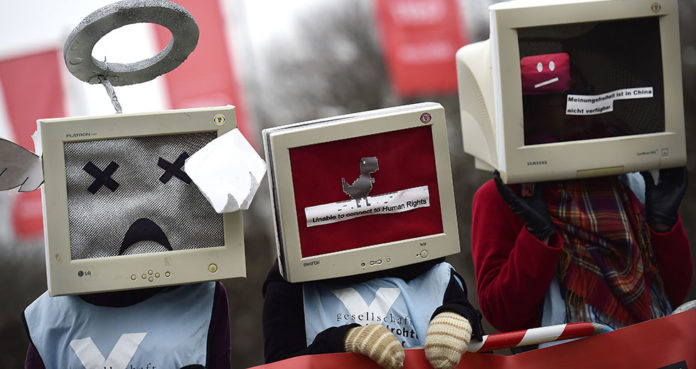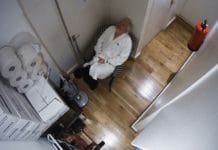
An annual Freedom House study has concluded that the internet is getting less and less free; the impact of surveillance, government attacks against freedom of speech and outright censorship is to blame.
The Internet Freedom Report written by the organization has noted that this is the fifth year in a row in which digital civil liberties worldwide has been knocked backwards.
29% of the 65 countries in the study are deemed “not free”, while only 27% of the countries have a “free” internet; for the first time, more countries in the world have a restricted internet than those which do not. Just last year, 19 countries had a “free” internet, while only 15 did not.
Note that the higher the score is, the LESS FREE a country is.

France’s score has increased by four points, largely because (ironically) French authorities took advantage of the Charlie Hebdo shooting (which was done at the behest of Islamists who apparently were anti-free-speech) to crack down on free speech. Government surveillance has also worsened since the attack. Topics which are censored (according to the report) in France include “conflict” and “social commentary”.
Seriously, governments are always looking for an excuse to steal away your freedom of speech.
The logic goes: “in order to protect your freedom (from a few minor threats that are about 2,000 times less likely to kill you than yourself), we will take it away (so you never pose a major threat to the government).
I digress; Cuba, in contrast to France, has fallen 8 points in the index. Apparently warming relations with the US and a decision by state telecom operators to cut the cost of internet provision in half has led to this increase. US internet providers will also be able to do business in the country, further reducing costs… seriously? The NSA now gets direct access to the Cuban people, and American corporations get to take over the Cuban internet, and that is why they are freer??
(Of course, Listed right there under “donors”: U.S. State Department’s Bureau of Democracy
Human Rights and Labor (DRL))
The US’s score remains unchanged from 2014; apparently Net Neutrality (the government being able to regulate the internet as though it were a utility… by censoring it etc… in order to “protect” us from corporations that already bribe them…) balances out the government’s calls for restrictions on encrypted communications and the intimidation and arrest of online journalists who had taken photos of police harassment cited in the report itself.
Interestingly, the US only gained two points in 2013’s report, the period of time when Edward Snowden revealed that the NSA was spying on everyone and the prosecution and subsequent suicide of Aaron Swartz…
Must be the DRL’s doing…
Anyway, the report concludes that internet freedom has decreased worldwide in these key respects (though not in the US of A… despite the fact that every one of these things also apply to it):
- Content removals increased: Authorities in 42 of the 65 countries assessed required private companies or internet users to restrict or delete web content dealing with political, religious, or social issues, up from 37 the previous year.
- Arrests and intimidation escalated: Authorities in 40 of 65 countries imprisoned people for sharing information concerning politics, religion or society through digital networks.
- Surveillance laws and technologies multiplied: Governments in 14 of 65 countries passed new laws to increase surveillance since June 2014 and many more upgraded their surveillance equipment.
- Governments undermined encryption, anonymity: Democracies and authoritarian regimes alike stigmatized encryption as an instrument of terrorism, and many tried to ban or limit tools that protect privacy.
Sources: Washington Post, Global Research, Freedom House
This Article (Study: Our Internet Freedoms Are Screwed) is free and open source. You have permission to republish this article under a Creative Commons license with attribution to the author(CoNN) and AnonHQ.com.





Denmark should be yellow. partly free
There was no taiwan on that map~